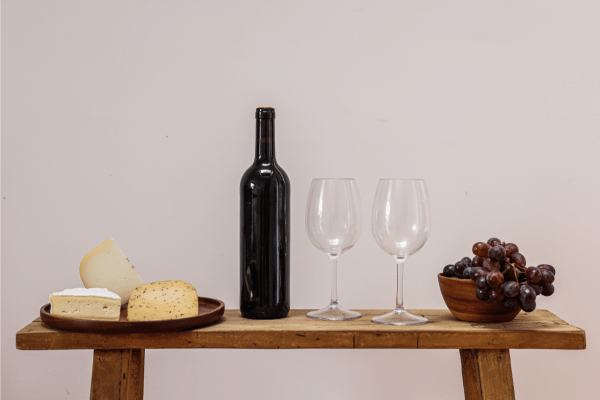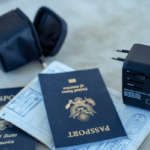Embarking on a journey through France’s culinary landscape is a dream for many. The allure of the best French cheeses and wines beckons food enthusiasts worldwide. This guide promises to unveil the secrets of France’s renowned culinary treasures. Dive into a world where every bite and sip tells a story of tradition, craftsmanship, and the French art de vivre.
Introduction to French Cheeses and Wines

In the heart of France, a world of flavors awaits. The country’s rich history is mirrored in its diverse cheese varieties. Each region boasts its own specialty, a testament to the local terroir. It’s not just about tasting; it’s about experiencing the essence of France. The journey begins with understanding the craftsmanship behind these culinary delights.
Transitioning from cheese to wine, the narrative deepens. French wines are celebrated globally for their exquisite taste and variety. From the lush vineyards of Bordeaux to the picturesque landscapes of Champagne, each bottle tells a unique story. The best French cheeses and wines share a bond, a perfect harmony that has been refined over centuries.
Exploring this culinary duo offers a glimpse into the soul of French culture. It’s more than just food and drink; it’s an invitation to indulge in a sensory adventure. The key is to savor each moment, letting the flavors guide you through a journey of discovery. With every cheese and wine, a new chapter of French heritage unfolds, inviting beginners to become part of this timeless tradition.
The Art of Cheese Tasting in France
Delving into the art of cheese tasting in France, one embarks on a sensory journey like no other. Each cheese is a reflection of its region’s culture and climate. Starting with soft, creamy Brie to pungent, blue Roquefort, the range is staggering. The experience is about more than taste; it’s about connecting with the story behind each cheese.
As you progress, you’ll notice the subtle nuances. The way a cheese’s flavor can shift with age or how it pairs with a crusty baguette. It’s a delicate dance of textures and tastes. Moreover, the setting plays a crucial role. Enjoying cheese in a quaint French village adds an authentic touch, enhancing the overall experience.
Finally, integrating the best French cheeses and wines elevates the tasting to a new level. The right wine can complement a cheese’s richness, creating a harmonious blend that delights the palate. This pairing isn’t just about following rules; it’s an art form in itself. Each combination is an opportunity to explore the depth and breadth of French culinary excellence.
Exploring France’s Prestigious Wine Regions
France’s wine regions are a tapestry of vine-covered hills and valleys, each with its own unique charm. Starting in Bordeaux, where the reds are as rich as the history, one can truly appreciate the depth of French winemaking. The region’s reputation for producing world-class wines is unmatched, offering a glimpse into the country’s passion for viticulture.
Transitioning to Burgundy, the experience becomes more intimate. Here, the focus is on the terroir, the subtle interplay between soil, climate, and vine. The wines from this region, both red and white, are renowned for their complexity and elegance. Tasting a Burgundy wine is like uncovering layers of flavors, each sip revealing something new and unexpected.
Further south, the Rhône Valley presents a different narrative. The wines are bolder, with a character shaped by the rugged landscape and the mistral winds. This region exemplifies the diversity of French wines, from the robust reds of the north to the fragrant rosés of the south. Each wine region in France offers a unique journey, inviting beginners to explore and savor the best French cheeses and wines.
Essential French Cheeses for Beginners
For those new to the world of French cheeses, starting with the essentials offers a solid foundation. Brie, with its soft, creamy texture and buttery flavor, is an excellent introduction. This cheese serves as a gentle entry point into the diverse landscape of French fromage, making it a favorite among beginners for its accessibility and mild taste.
Next, Camembert provides a slightly more intense experience. Similar in texture to Brie, Camembert offers a deeper, earthier flavor profile. Its rich taste and creamy interior, coupled with a bloomy rind, make it a staple in the French cheese repertoire. Tasting Camembert is like taking a step further into the complexity of French cheeses, bridging the gap between mild and more robust varieties.
Lastly, for those ready to explore the stronger side of French cheeses, Roquefort is a must-try. This blue cheese, known for its sharp and tangy taste, is a testament to the craftsmanship behind French cheesemaking. Paired with the best French cheeses and wines, Roquefort can transform any culinary experience, offering a bold flavor that stands out in any cheese selection.
The Basics of Wine Tasting Etiquette
Wine tasting etiquette is an essential aspect of enjoying the full spectrum of what French wines have to offer. The journey begins with the visual examination of the wine, observing its color and clarity. This initial step sets the stage, offering clues about the wine’s age and grape variety. It’s a moment of anticipation, where one prepares to delve deeper into the wine’s characteristics.
The next phase involves swirling the wine gently in the glass. This action releases the wine’s aromas, a bouquet of scents that can range from fruity to floral, earthy to spicy. Inhaling these aromas before tasting allows one to appreciate the complexity of the wine. It’s an integral part of the experience, bridging the gap between the visual and the taste.
Finally, the moment of tasting arrives. Sipping the wine, letting it coat the palate, reveals the layers of flavor. It’s not just about the taste but the texture and the finish. This step is where the harmony between the best French cheeses and wines becomes evident. The right pairing can elevate the tasting experience, highlighting the subtleties of both the cheese and the wine.
Pairing French Cheeses with the Perfect Wines

Mastering the art of pairing involves understanding the balance between the flavors of French cheeses and the characteristics of wines. A soft, creamy Brie pairs beautifully with a light, crisp Chardonnay, where the wine’s acidity complements the cheese’s buttery texture. This combination is a classic example of how contrasting elements can create a harmonious experience, enhancing the enjoyment of both the cheese and the wine.
For a more robust cheese like Roquefort, a sweet Sauternes makes an excellent counterpart. The sweetness of the wine balances the sharpness of the blue cheese, creating a pairing that is both bold and refined. This juxtaposition of flavors showcases the versatility of French culinary traditions and the depth of possibilities when it comes to cheese and wine pairings.
Exploring the world of cheese and wine pairings opens up a realm of culinary adventures. Whether it’s a nutty Comté with a rich, aged Burgundy or a tangy Chèvre with a zesty Sauvignon Blanc, the right pairing elevates the tasting experience. The best French cheeses and wines share a synergy that, when matched thoughtfully, can turn a simple meal into an unforgettable gastronomic journey.
Off-the-Beaten-Path: Discovering Hidden Culinary Gems
Venturing beyond the well-trodden tourist paths can lead to discovering France’s hidden culinary gems. Small, family-run cheese farms and vineyards offer an intimate glimpse into the artisanal heart of French gastronomy. These places, often nestled in picturesque villages, provide a unique experience where one can witness the dedication and passion behind every product.
In these lesser-known locales, the opportunity to sample rare cheeses and wines becomes a highlight. Each visit tells a story of tradition and innovation, where age-old techniques meet contemporary tastes. Engaging with the artisans, hearing their stories, and tasting their creations, adds a personal touch to the culinary adventure, making each bite and sip a treasure.
Moreover, exploring these hidden corners of France offers a sense of discovery and connection. It’s not just about the food and drink but about understanding the culture and the people. The best French cheeses and wines often come from these unassuming places, where the richness of the experience lies in the simplicity and authenticity of the encounter.
Planning Your Culinary Tour of France
Embarking on a culinary tour of France requires thoughtful planning to ensure a rich and diverse experience. Begin by mapping out the regions known for their cheeses and wines, allocating time to explore both the famous and the lesser-known areas. This approach ensures a comprehensive understanding of the French culinary landscape, from the lush vineyards of Bordeaux to the rustic cheese farms of Normandy.
Incorporating visits to local markets and festivals into your itinerary can enhance the journey. These events offer a chance to sample a wide array of local specialties in a vibrant, authentic setting. Engaging with local producers and artisans at these gatherings provides insights into the traditions and techniques that define French culinary arts. It’s an opportunity to delve deeper into the culture that shapes the best French cheeses and wines.
Finally, consider booking guided tours or tasting sessions at selected vineyards and creameries. These experiences are curated to educate and inspire, providing an in-depth look at the production processes and the stories behind the products. Guided tours also offer the advantage of expert recommendations, ensuring that you discover the finest examples of French cheeses and wines, making your culinary tour an unforgettable adventure.
Tips for Buying French Cheeses and Wines
When buying French cheeses and wines, the first tip is to seek out specialty shops or local markets. These venues often offer a wide selection, from well-known favorites to rare finds. The knowledgeable staff can provide valuable advice, helping you select products that cater to your taste and occasion. This personalized shopping experience ensures that you take home not just a product, but a piece of French culinary heritage.
Another important consideration is to pay attention to the labels. For wines, look for terms like “AOC” (Appellation d’Origine Contrôlée) or “AOP” (Appellation d’Origine Protégée), which indicate regulated production areas and standards. For cheeses, labels can offer information on the region of origin, the type of milk used, and whether the cheese is farmhouse (fermier) or artisanal (artisan), guiding you to high-quality selections.
Lastly, don’t hesitate to sample before you buy. Many shops encourage tasting, which can be an enlightening part of the purchasing process. It’s an opportunity to explore different flavors and textures, ensuring you’re truly satisfied with your choices. Whether it’s the creamy decadence of a Brie or the robust depth of a Bordeaux, sampling allows you to discover the best French cheeses and wines, making each selection a deliberate and enjoyable decision.
Conclusion: Embarking on Your French Culinary Adventure
As you conclude your exploration of French cheeses and wines, remember that this journey is just the beginning. The world of French gastronomy is vast and varied, offering endless opportunities for discovery and delight. Each cheese and wine has its own story, rooted in centuries of tradition and craftsmanship, waiting to be uncovered and appreciated.
Embracing the diversity of French culinary offerings enriches not only your palate but also your understanding of French culture and history. The knowledge gained from this adventure goes beyond mere taste; it encompasses the art of living well, a cornerstone of French philosophy. The exploration of the best French cheeses and wines is a testament to the joy of savoring life’s finer pleasures, encouraging a deeper appreciation for the subtleties of flavor and aroma.
Looking ahead, the experiences and tastes encountered on this journey are sure to inspire further culinary explorations. Whether revisiting a beloved cheese, experimenting with new wine pairings, or planning your next visit to France, the adventure continues. With each new taste, you carry forward the spirit of discovery, celebrating the rich tapestry of French cheeses and wines and the enduring allure of their culinary heritage.
in summary
Embarking on the journey of exploring French cheeses and wines offers a gateway to understanding the rich tapestry of France’s culinary heritage. This adventure, filled with the discovery of diverse flavors, textures, and aromas, not only enhances one’s palate but also deepens the appreciation for the meticulous craft behind each product. The exploration goes beyond mere tasting; it’s about connecting with the stories, the people, and the landscapes that shape these iconic elements of French cuisine.
Furthermore, this journey invites enthusiasts to delve into the art of pairing, where the harmonious blend of cheese and wine creates an unparalleled gastronomic experience. The best French cheeses and wines, with their wide range of profiles, offer endless possibilities for experimentation and enjoyment. Each pairing is an opportunity to celebrate the intricate balance and subtle nuances that define French culinary excellence.
In conclusion, the exploration of French cheeses and wines is more than a culinary pursuit; it’s a voyage into the heart of French culture and tradition. As you continue to explore and savor these exquisite offerings, you carry with you the essence of France, a treasure trove of flavors waiting to be discovered and cherished.
III. Frenquently Asked Questions About France
- How do I prepare for the weather in France?Check the forecast close to your departure. Summers can be hot, especially in the south, while winters are mild but can be cold in the north and Alps. Spring and autumn have mild and pleasant weather, but rain is possible, so pack accordingly.
- What are some budget tips for traveling in France?Eat like a local at bakeries and markets, stay in hostels or use vacation rentals, take advantage of free museum days, and use public transportation or bike-sharing services.
- What are France's top natural wonders to visit?The French Alps for skiing and hiking, the lavender fields of Provence, the dramatic coastline of Normandy, and the verdant vineyards of Bordeaux.
- How can I experience the French lifestyle?Stay in a local neighborhood, shop at outdoor markets, enjoy long meals at cafes, and take time to stroll through parks and city streets.
- What are the best souvenirs to bring back from France?French wine and cheese, perfumes, fashion items, local handicrafts, and iconic foods like mustard from Dijon or sea salt from Guérande.
- What should I know about nightlife in France?Nightlife starts late, with many not heading out until after 10 PM. Paris, Lyon, and Marseille offer vibrant scenes with bars, clubs, and live music venues.
- How do I get internet access while in France?Purchase a prepaid SIM card with data, rent a portable Wi-Fi device, or look for Wi-Fi hotspots in cafes, hotels, and public areas.
- What are some day trips I can take from Paris?Visit Versailles to see the palace, explore the medieval city of Chartres, enjoy the impressionist art at Giverny, or tour the Champagne region.
- How do I stay safe while traveling in France?Be aware of your surroundings, especially in crowded tourist areas. Keep valuables secure and avoid carrying large amounts of cash.
- What are the best activities for families in France?Disneyland Paris, educational museums like Cité des Sciences, exploring castles in the Loire Valley, and enjoying the beaches on the French Riviera.

Ryan Taylor, a seasoned traveler with over a decade of experience exploring Europe’s nooks and crannies, offers a wealth of knowledge and unique insights into the continent’s diverse cultures and landscapes. His passion for travel began in his early twenties, and since then, Ryan has journeyed through numerous European countries, collecting stories, tips, and a deep understanding of each destination’s unique charm. His blog entries are not just guides but narratives enriched with personal experiences, making every recommendation and piece of advice relatable and practical for fellow travel enthusiasts. With a keen eye for hidden gems and a love for sharing his adventures, Ryan’s writings are a treasure trove for anyone seeking to discover the beauty and richness of Europe.






